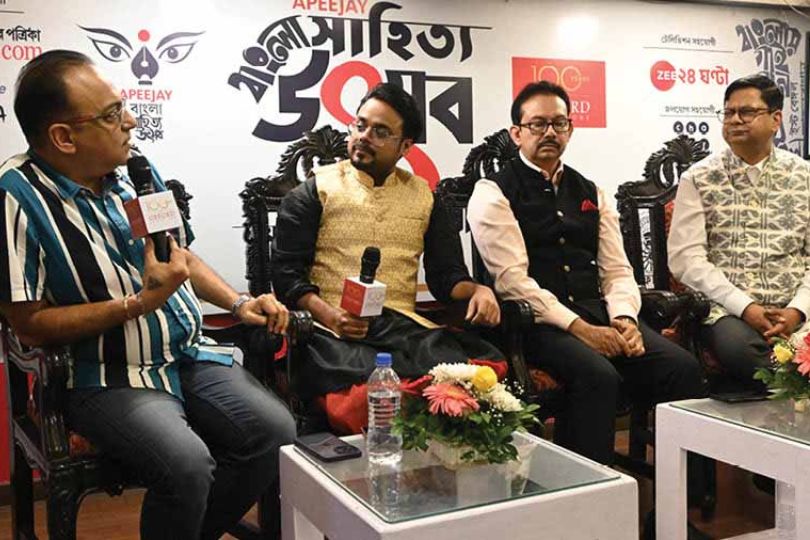Apeejay Bangla Sahitya Utsob Celebrates Bengali lit with Aplomb in Noy Noy Kore Noye Paa.
Explore the charm of Bengali literature at Apeejay Bangla Sahitya Utsob, a vibrant literary festival celebrating iconic authors and cultural milestones.on Dec 05, 2023

The three-day literary festival addressed key issues and praised 'Bangla sahitya.'
The Apeejay Bangla Sahitya Utsob (ABSU) celebrated its ninth anniversary with the tagline Noy Noy Kore Noye Paa and was joined by notable luminaries from the Bengali literary community.
My Kolkata, the literary festival's web partner, showcases highlights from the sessions held at Oxford Bookstore, Park Street, from November 24 to 26.
Festival highlights include:
The Apeejay Bangla Sahitya Utsob (ABSU) 2023 marked the 200th birthday of Michael Madhusudan Dutt and the 100th anniversary of Sukumar Roy's Abol Tabol. Legendary singers Suchitra Mitra and Kanika Bandyopadhyay were also honoured during the literary event.
A memorable flag-off
The literary festival was started on November 24 by well-known poet and novelist Joy Goswami, in the company of Swagat Sengupta, festival director and CEO of Oxford Bookstores, and author Abhirup Mukhopadhyay. Sengupta reflected on the Apeejay literary festival's legacy and purpose of vision, saying, 'ABSU has always endeavoured to improve the prestige of Bengali literature, offering a venue for Bengali literary fans to engage with famous authors, scholars, and artists.'
Goswami, who was speaking with author Abhirup Mukhopadhyay at the time, mused on Bengali poetry and poets of his generation. In an almost hour-long chat, Goswami reflected on his journey of learning after beginning as a poet at the age of 13 and read selections from the works of emerging poets such as Tushar Biswas, Jeet Pal, and session moderator Abhirup Mukhopadhyay.
The following session, titled Jonmo Twobo Bonge, included Abheek Majumdar, Debotosh Das, and Shaktisadhan Mukhopadhyay discussing Michael Madhusudan Dutta's life and works. On day one, the other two sessions were Anubad Niye Badanubad and Sahityer Seemana Boier Patatei Thamena. Debasish Sen spoke about establishing a literary village and naming parks after literary characters such as Goopy Gyne and Bagha Byne.
Day two was jam-packed with books.
On day two, sessions focused on emerging writers' literature, the relevance of poet meetings, and the large body of literature on rural life. Popular names in Bengali literature such as Hamiruddin Midya, Swapnamoy Chakraborty, Nalini Bera, Kasturi Sen, and Aditi Basu Roy share their perspectives. In the presence of Somen Sengupta, Basu Acharya and Soumya Basu discussed political literature. The talks quickly shifted to the introduction of cruelty in novels and stories, with Anjan Dutt, Indranil Sanyal, and Nandini Nag discussing their experiences.
'Nishthurota ebong jontrona baad diye kono sahitya sombhob noy,' added Dutt, and later, in an exclusive interview with My Kolkata, on the role of violence in stories of love lost or unrequited love, remarked: 'Unrequited love is terrible in and of itself. It was all about love and darkness, whether it was Jude the Obscure or Devdas. I believe that great stories do not have happy endings'.
The evenings were spent debating whether comic books and graphic novels will continue to be regarded children's literature, as well as the eventual elimination of literary supplements. 'Samoyikpatrey mando golpo upanyaser guruttwo komche,' novelist Pracheta Gupta said of literary supplements. 'Bhalo golpo uponyasher guruttwo obosyoi barche,' says the guruttwo.
Sujog Bandyopadhyay, a graphic writer, told the audience that he is working on a graphic novel about Uttam Kumar's life.
The second day of the lit fest concluded with Mir entering the stage to discuss how memes and jokes on Facebook are affecting comedy literature, often breaking the audience in laughter. Mir's closing remarks, "Bangla Sahitya ba rasa sahitya ke konthasha korte pare emon meme ekhono toiri hoyni," drew thunderous ovation from the audience's Bengali literature enthusiasts. According to author Ullas Mallick, 'Aajker notun projonmer pochondo-opochondo jantey hasir lekhok ke jokes meme onoborot chorcha korte hobe.' According to Subhankar De, 'Hasir golpo ekta onubhuti shristi kore, jokes kintu taa kore na.'
A promising conclusion to a memorable festival
The literary festival's final day was jam-packed, beginning with a quiz and progressing to debates on science fiction and literature focusing on folklore, history, and biography. During the science fiction session, author Anusthup Sett emphasised the need of bringing good science fiction to the attention of everyone.
Dr. Anuttama Banerjee, Samragnee Bandyopadhyay, Payel Sengupta, and Dwipannita Roy led a discussion on feminist literature, focusing on the history and significance of feminism. Dr. Banerjee remarked on how 'Naribaad maane purush baad diye dewa noy' is a phrase that he uses. 'Samarpan aday kora jayna, anugatyo aday kora jay.' she added. Author Payel Sengupta discussed steadily working to dismantle prevailing preconceptions.
Sadat Hossain, a prominent author from Bangladesh, spoke with Amar Mitra about the past, present, and future of literature in Bangladesh. Debasish Mukhopadhyay emphasised the importance of the illustrations in Abol Tabol alongside the poetry, and how Ray authored 130 poems in total, 44 of which are included in Abol Tabol. The programme concluded with a debate on Rashtrer Roktochokkhu Bonam Sahitya Rajneeti between Anita Agnihotri, Tapan Bandyopadhyay, and Jaya Mitra.



.jpg)






.jpg)

.jpg)
.jpg)
.jpg)
.jpg)
.jpg)










Sorry! No comment found for this post.